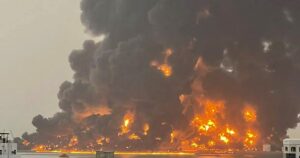ButSpeak.com
News which Matters.

In retaliation for a deadly drone attack on Tel Aviv, Israeli fighter jets bombed a port in Yemen controlled by the Iran-backed Houthi militia, marking the first public strike on the group.
Israeli fighter jets launched a significant airstrike on a Yemeni port controlled by the Iran-backed Houthi militia on Saturday. This action came as a direct retaliation for the Houthi group’s deadly drone attack in Tel Aviv just a day earlier. This strike marks the first time Israel has publicly targeted the Houthi militia after enduring months of escalating attacks from the group.
The airstrikes specifically targeted a power station, along with gas and oil depots located in the Red Sea port city of Hodeidah. This information was confirmed by a Houthi spokesman and two regional officials who requested anonymity because they were not authorized to speak publicly on the matter.
Israel defended its actions, stating that the bombed sites were used for military purposes. Rear Adm. Daniel Hagari, the Israeli military spokesman, acknowledged that some “dual use” targets, which serve both civilian and military functions, were also struck. He emphasized the operation’s unprecedented scale, calling it “one of the farthest and longest ever conducted by the Israeli air force.” According to Hagari, the port of Hodeidah is a critical supply hub for Iran to funnel weapons to its Houthi allies in Yemen, who have launched over 200 missiles and drones at Israel in recent months.
However, the Hodeidah port is not only a military asset but also a vital entry point for essential goods, including food and oil, destined for northwestern Yemen. This region, under Houthi control, is home to at least two-thirds of Yemen’s population, which relies heavily on these supplies. The airstrikes have therefore exacerbated the humanitarian crisis in an already impoverished nation.
The Ministry of Health in Houthi-controlled Sana, Yemen’s capital, reported that at least 80 people were wounded in the attack, most suffering from severe burns, as per The Associated Press. The incident underscores the escalating conflict in the region and the severe implications for civilians caught in the crossfire.
The drone attack on Tel Aviv, which prompted Israel’s retaliatory strikes, highlights the increasing reach and boldness of the Houthi militia. The group’s actions have been seen as part of a broader strategy by Iran to exert its influence in the region through proxy forces. The conflict has not only destabilized Yemen but also threatens to draw in more regional powers, further complicating efforts to achieve peace.
Israel’s response signifies a critical shift in its military strategy, directly targeting Houthi infrastructure in Yemen. This could potentially escalate the conflict, drawing more international attention and possibly intervention. The airstrikes also reflect the broader geopolitical struggle in the Middle East, where nations are vying for influence and control through both direct and proxy conflicts.